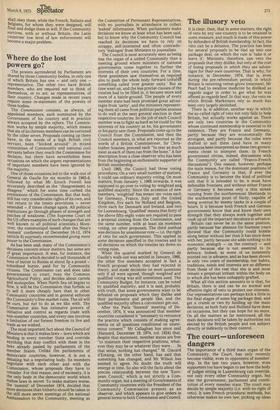The illusory veto
It is clear, then, that in some matters, the right of veto by any one country is to be retained in
some measure, and much is made of this power by defenders of British membership. In fact, the veto can be a delusion. The practice has been for several proposals to be tied up into one package deal, on which the rule is 'take it or leave it'. Ministers, therefore, can veto the proposals that they dislike, but only at the cost of losing proposals in which they see advantages for their own countries. That is why, for instance, in December, 1974, that is, even during the pre-referendum period, in which Britain is receiving velvet-glove treatment, Mr Peart had to swallow medicine he disliked as regards sugar in order to get what he was offered as regards beef. In that way, the veto on which British Marketeers rely so much has been very largely abolished.
There is, in addition, another way in which the so-called right of veto not only fails to help Britain, but actually works against us. There are only two countries in the Community whose continued membership is essential to its existence. They are France and Germany, partly because they are economically the strongest, and partly because the rules were drafted to suit them (and have in many instances been interpreted as these two governments chose to interpret them. In French government circles, indeed, discussions with the Community are called "Franco-French discussions"). One reason, however, perhaps the main reason, for the dominant positions of France and Germany is that, if ever the Community is to become the kind of political unit that it is intended to be, it must have defensible frontiers, and without either France or Germany it becomes only a thin streak running from the northernmost Shetlands to the southernmost point of Sicily, capable of being overrun by enemy tanks in a couple of hours. It is because both French and German governments know that and know their own strength that they always work together and cook up all the important decisions in advance.
Britain can never be in the same position, partly because her absence for fourteen years showed that the Community could hobble along better without her than it has since done with her, partly because she adds nothing to its economic strength — on the contrary — and partly because she is not essential to its defence. Indeed, as some of us insistently pointed out in advance, and as has been shown in only two years of membership, her habits, traditions, needs and interests are so different from those of the rest that she is and must remain a perpetual irritant within the body on to which she has been unhappily grafted.
What all this section amounts to is that, for Britain, there is and can be no normal and effective right of veto to protect our interests. Our representatives can perhaps kick a little in the final stages of some big package deal, and get a crumb or two by holding up the main decisions, as both Italy and Holland have done on occasions, but they can hope for no more. On all the matters so far mentioned, all the main decisions will be taken by authorities not elected by the British people and not subject directly or indirectly to their control.
The court unforeseen dangers










































 Previous page
Previous page